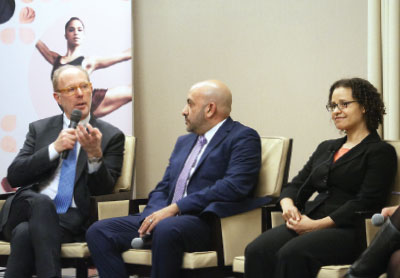Psychiatrist’s Film ‘Bedlam’ Previewed for Capitol Hill Audience
Abstract
McCance-Katz said SAMHSA recently made the mental health block grant rules more flexible to allow community-based mental health professionals to provide services to incarcerated individuals with serious mental illness.

Ken Rosenberg, M.D., who produced “Bedlam: An Intimate Journey Into America’s Mental Health Crisis,” talks with Colin Diaz, M.D., and Julea McGhee, M.D., M.P.H. They are psychiatrists who appear in the film and work in the crowded and overwhelmed L.A. County Hospital emergency department.
Psychiatrist Ken Rosenberg’s shattering new film, “Bedlam: An Intimate Journey Into America’s Mental Health Crisis,” airing on PBS this month, was previewed last month on Capitol Hill before an audience that included congressional staff and federal government leaders.
Among them were Elinor McCance-Katz, M.D., assistant secretary for mental health and substance use in the Department of Health and Human Services and head of the Substance Abuse and Mental Health Services Administration (SAMHSA).
“Bedlam is an important book and now documentary that details in moving terms the plight that the untreated seriously mentally ill [SMI] face on a daily basis in our communities,” McCance-Katz said in comments prior to the 40-minute preview of the 90-minute film. “Compounding the disability of psychotic illness is the inability of many to even understand or recognize that they suffer from a serious mental illness.”
Rosenberg’s film was previewed at last fall’s IPS: The Mental Health Services Conference. It premiered on PBS’s “Independent Lens” on April 13 and can be viewed at pbs.org until May 13.
Rosenberg, who has been making films since his days as a medical student, was inspired by the tragic plight of his late sister, who had SMI.
He cautioned the audience last month that much of “Bedlam” is difficult to watch. The film focuses on homeless mentally ill people in Los Angeles and depicts in depth the stories of two periodically homeless in-dividuals, Todd and Monte.
Viewers first meet Todd in the middle of a manic episode, shouting and cursing at nurses and doctors at Los Angeles County+USC Medical Center as he is handcuffed and later placed in four-point restraints. A year later, he is back on Skid Row, the actual name of a neighborhood that is considered the epicenter of homelessness in the city that has become emblematic of the public mental health crisis in America.
Monte is an African American man with schizophrenia. He is sent to a mental health court instead of jail and receives supported employment with the help of his devoted sister Patrisse, who becomes a mental health advocate and activist (see Psychiatric News).
The film also recounts the wider, tragic history of deinstitutionalization, a bipartisan disaster presided over by Republican and Democratic administrations and features a candid discussion with past APA presidents about the past failures of the profession. The culmination of that history has been the transitioning of people with SMI from the streets to the nation’s jails and prisons.
The appointment of McCance-Katz, an addiction psychiatrist, to the new position of assistant secretary for mental health and substance use, is part of a new focus at SAMHSA on people with SMI and the opioid crisis. In her remarks, she noted that Congress has enabled SAMHSA to assist those with SMI by providing community-based services, including direct payment for outpatient treatment services through mental health block grants, training and technical assistance to health care professionals, criminal justice diversion programs, first-episode psychosis programs, assertive community treatment programs, and assisted outpatient treatment programs.
She also said SAMHSA recently added new flexibilities to the mental health block grant that allow community-based mental health professionals to provide comprehensive, individualized mental health services to those incarcerated and living with SMI.
“Our goal is to help a person receive necessary and appropriate care as quickly as possible and encourage the development of relationships with community clinicians to better ensure that upon release, the individual will continue in outpatient treatment and will be able to live a successful and productive life in the community,” she said.
In addition to remarks by McCance-Katz, the presentation following the film preview included a conversation among Rosenberg and two other psychiatrists who appeared in the film—Colin Dias, M.D., and Julea McGhee, M.D., M.P.H. (In the film, both see patients in the emergency department of L.A. County hospital, overwhelmed by sometimes violent patients with SMI). Also speaking were Daniel Gillison, CEO of the National Alliance for Mental Illness (and former director of the APA Foundation); John Snook Esq., executive director of the Treatment Advocacy Center; and Leah G. Pope, Ph.D., senior research fellow at Vera Institute of Justice.
“Projects like ‘Bedlam’ help to raise the awareness of Americans to the needs of some of our most vulnerable,” McCance-Katz said. “We are grateful for the focus on this important issue for so many Americans and their families.” ■



